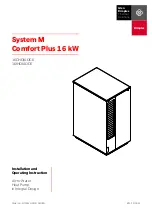
INSTALLATION
1.
Installation of the Collection reservoir:
Locate the water collecting reservoir in a suitable position
below the bottom of the drip tray of the air conditioner. The
reservoir can be located inside the air handler.
Air conditioners are not always correctly cleaned in the factory
during manufacture. Because packaging or manufacturing
debris (styrofoam, cardboard, etc.) may be present in the drip
tray, it is recommended to rinse the air conditioner drip tray
with water before connecting the reservoir unit.
Attach the 1/2 inch ID (13mm) tubing (Figure 1, item 1) to the
reservoir intake and the drip tray drain. Be certain to support
the reservoir when attaching tubing and that tubing is not
kinked when reservoir is in place. Connect the 5/32 inch ID
(4mm) tubing (item 3) to the outlet of the reservoir marked
“VENT”. The free end of the vent tubing must be secured
above the highest level of the drip tray in the air conditioner to
prevent overflow. Be certain that the vent tubing is not kinked
when installed.
Be certain that the bottom of the reservoir is within (+/-) 15
degrees of being level with the optimum performance being
when the reservoir is level. If the reservoir is not mounted
properly, the float mechanism may not function properly and
may cause the unit to overflow.
2.
Installation of the Control Unit/Pump:
The control unit/pump can be mounted internal or external
to the air handler using the Ty-Rap provided. The control
unit/pump is not submersible and must be installed so that
water cannot be dripped, splashed or sprayed onto the control
unit/pump. The maximum suction lift of the pump is 3 feet (1
meter), therefore the control unit/pump cannot be installed
more than 3 feet (1 meter) higher (vertically) than the collec-
tion reservoir. See performance curve for pump flow rate and
maximum amount of condensate that can be removed for any
given discharge head.
Figure 2.
Connect the 5/32 inch (4mm) tubing (item 5) to the intake of
the pump (indicated by the direction of flow arrow on the side
of pump) and to the outlet on the reservoir marked “PUMP”
using the hose clamps provided (item 4). Be certain the tubing
is not kinked when pump is installed.
Attach a length of 5/32 inch ID (4mm) tubing (not provided) to
the discharge of the pump using a hose clamp (item 4). The
other end of this discharge tubing is to be directed into a grav-
ity-feed drain. Maximum horizontal run is 60 feet (18 meters)
which results in a drop in flow rate of 10-15%.
NOTE:
The end of the discharge tubing that is directed into the
gravity-feed drain must be positioned such that it is no more than
3 ft. (1 meter) below (vertically) the collection reservoir, or it can
create a siphon, causing the pump to lose its prime. This condition
would cause the pump to reprime itself during each cycle, result-
ing in noisy operation and shortening the life of the pump.
Also, be sure the pump is not located next to insulation or flam-
mable material. Be certain that there are no sharp bends or kinks
in the vent, suction and discharge tubing. Keep all tubing and
cables clear of moving parts in the air handler.
ELECTrICAL CONNECTIONS
SHUT OFF ELECTRICAL POWER AT FUSE BOX BEFORE MAKING
ANY CONNECTIONS. ALL WIRING MUST COMPLY WITH LOCAL
ELECTRICAL AND BUILDING CODES, AS WELL AS THE MOST
CURRENT NATIONAL ELECTRIC CODE (NEC). CHECK THE
CONTROL UNIT LABEL FOR PROPER VOLTAGE REQUIRED. DO
NOT CONNECT TO VOLTAGE OTHER THAN THAT SHOWN.
The EC-400 is designed to be used with a grounding conductor.
To reduce the risk of electrical shock, be certain that it is con-
nected to a properly grounded circuit. The use of a ground fault
circuit interrupter is recommended.
Connect the cable from the collection reservoir to the control
unit/pump by inserting the 4 prong plug connector into the cor-
responding socket on the control unit/pump.
All wiring should be performed by a qualified electrician. The
control unit/pump must be connected to a constant power sup-
ply, not an intermittent source such as a fan or limit control circuit.
To prepare the power supply leads from the power supply to be
attached to the control unit/pump terminal block, the lead wire
insulation jacket is to be stripped approximately 1/4". To attach the
power supply leads to the terminal block of the control unit/pump,
remove the screw cover (item 6) exposing the set screws. Confirm
that the lead wire slots in the terminal block are open (set screws
turned counterclockwise).
Identify the live, neutral and ground power supply leads from
the power supply and refer to the label on the EC-400 control
unit/pump to identify the correct terminal locations for each of the
power supply leads. Insert the correct lead completely into the
corresponding slot of the terminal block. Tighten the set screw
(turn clockwise) that corresponds with the appropriate terminal
block slot to secure the lead in place.
WIrING DIAGrAM FOr POWEr SUPPLY TO CONTrOL UNIT:
blue or white(neutral) to N
brown or black (line) to L
green/yellow or green (ground) to ground
A fuse (purchased separately) should be fitted in the line lead
of the power cable supplying the control unit/pump.
0.50A — 115V 0.20A — 230V
SAFETY SWITCH CONNECTIONS
The unit is equipped with a high water safety switch with a maxi-
mum rated switching current of 8 amps at 250VAC or 5 amps at 30
VDC. Connect to the safety switch as described below to obtain
the desired response:
2
Содержание EC-400 Series
Страница 11: ......






























